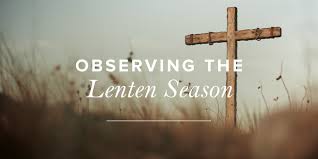There are some spiritual practices that Christians implement during the season of Lent to help break bad habits and attitudes, returning us to a healthy path of right living for God. These practices also help us focus on loving God and other people.
Here are some practices during the 40 days of Lent:
1. Prayer 2. Repentance 3. Fasting 4. Giving
1. Prayer: Prayer can take place anytime and anywhere. Prayer is simply talking with God. Although we can talk to Him like a close friend, we have a reverence and awe in His presence. Words can be few, as He knows our hearts. Nothing is too big or small to bring to God in prayer; our fears, hopes, health, concerns, our work, marriage, and children. He knows us and loves us more than we can imagine.
When we pray during this time of Lent, it is important to ask God to forgive us from falling short through our thoughts, actions, and words.
2. Repentance: Repentance is like turning around and changing directions, doing a 180 degree turn. We begin by admitting how we’ve fallen short, apologizing earnestly, and with humility of heart, asking God for forgiveness.
The Apostle Paul teaches us about Jesus when he said, “He is so rich in kindness and grace that he purchased our freedom with the blood of his Son and forgave our sins” (Ephesians 1:7 NLT).
As Christians, our names are written in the Lamb’s Book of Life. We are saved by grace, by the sacrifice and blood of Jesus. He will however, return to judge the living and the dead (John 5:27). Thus, we will all still be held accountable for our actions.
Darrell Johnson, one of my favorite authors explains, “Deeds reveal values. Deeds reveal character. Deeds reveal our true allegiance. And deeds reveal what we really believe. When the New Testament declares the good news that we are justified by faith, it does not mean deeds do not matter. The Apostle Paul, who most consistently speaks of justification by faith, is the one who also most consistently speaks of accountability based on deeds: Romans 2:6 – where he speaks of God, who in the day of accounting, ‘will render to everyone according to his or her deeds.’”
Basically we all have a book filled with our life; the good, bad, and the ugly. However, everything that we have confessed as sin to God has been erased, crossed out, blotted clean – like a mistake fixed by “White-Out!” That is God’s love and grace.
Do you see the importance of confessing to God and repenting? I need to be doing this daily… probably hourly.
In the book of Psalms it says,
11 For as high as the heavens are above the earth,
so great is his love for those who fear him;
12 as far as the east is from the west,
so far has he removed our transgressions from us.
13 As a father has compassion on his children,
so the Lord has compassion on those who fear him;
14 for he knows how we are formed,
he remembers that we are dust”(Psalm 103:11-14 NIV).
When we come forward to receive ashes on Ash Wednesday, we are saying that we are sorry for our sins, and that we want to use the season of Lent to correct our wrongs, clean our hearts, control our wants and grow in holiness so we will be prepared to celebrate Easter with great joy and celebration!
3. Fasting: Lent often involves a form of “fasting,” which usually means some kind of hunger. When most of us think “fast” we think “speed.”
The funny thing is, the spiritual use of the word means more of the opposite. Fasting is a “slow” thing.
It makes us stop and notice something—something we’re missing, something we’re going without. Something we subtract from our lives. Like food.
Fasting usually means not eating food, or certain kinds of food, for a set period of time. (Such as eliminating chocolate, candy, coffee, meat, or cheese)
But fasting is a practice that goes beyond food. It can mean choosing to go without TV, our iPad, coffee, a bad habit, or criticizing others.
When you stop doing something you’re used to doing (like complaining or eating chocolate), you notice different things. Lent is like that.
The reason Lent is 40 days is because Jesus spent 40 days in the desert, where he fasted and where Satan tempted him. Jesus used his forty days to get away from distractions and spend time with God.
Lent is a time when the Church throughout the ages has chosen to pause and notice something. That “something” is the journey of Jesus to the cross. Alongside his journey, we’re also called to notice our own journeys and how we are living.
What are some things you could fast from this Lent Season?
The point of sacrificing something important is to remember that God wants to be the most important part of our lives.
Fasting isn’t just about subtracting for the sake of subtraction. We subtract something so that we—or God—can add something new.
Think of it like this, what happens in the emptiness left by whatever we choose to give up? If we give up an hour of TV, what do we do with those extra 60 minutes? If we give up buying coffee, what do we do with that money? Can we spend that time in prayer or reading our Bibles instead? Can we give our money to those in need instead?
4. Giving: “Almsgiving” – means giving money or goods to people in need. This giving can also be true of your time and talents as gifts to others in need.

Challenges:
1. Will you choose to pray daily and often? Spending time in the presence of God in conversation.
2. What will you repent from? What will you apologize for, ask forgiveness & turn 180° from?
3. What will you choose to fast from? Subtract something that is not good for you.
4. What will you choose to give during these 40 days? More compassion, groceries for a food bank, or a willingness to help others?
Let’s Pray:
Heavenly Father, thank you for reminding me with Ash Wednesday, that I am to be right with you at all times. I confess my sins to you. I have fallen short of your glory and without your mercy and grace, I would be dust. I repent now. As I enter into this Lenten season, be near to me.
Thank you Lord, that Easter is coming! Sin and death don’t win because of you, Jesus!
Thank you that the ashes on my forehead or hand, do not symbolize what will become of me. From dust I might have been formed, but my body and spirit will be made new when I join you in heaven. Help me look forward to that day, and guide me over the next 40 days, Lord. In Jesus’ name, Amen. (Which means, “So let it be.”)


You are seriously the best writer ever! What a gift. Such an inspiration with every read. I sent this to my bible study ladies and a few other friends. 🙂
Wonderful! Thank you for passing this along 🙂
Honey,
You inspire me to be a better person. You say everything so well, and I felt so moved to follow the practices of lent.
That is wonderful and makes my heart happy! Thank you for reading 🙂